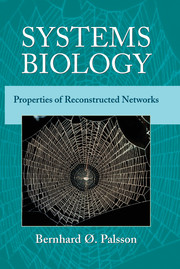Book contents
- Frontmatter
- Contents
- Preface
- 1 Introduction
- 2 Basic Concepts in Systems Biology
- PART I RECONSTRUCTION OF BIOCHEMICAL NETWORKS
- PART II MATHEMATICAL REPRESENTATION OF RECONSTRUCTED NETWORKS
- PART III CAPABILITIES OF RECONSTRUCTED NETWORKS
- 12 Dual Causality
- 13 Properties of Solution Spaces
- 14 Sampling Solution Spaces
- 15 Finding Functional States
- 16 Parametric Sensitivity
- 17 Epilogue
- APPENDIX A Nomenclature and Abbreviations
- APPENDIX B E. coli Core Metabolic Network
- Bibliography
- Index
17 - Epilogue
from PART III - CAPABILITIES OF RECONSTRUCTED NETWORKS
Published online by Cambridge University Press: 05 September 2012
- Frontmatter
- Contents
- Preface
- 1 Introduction
- 2 Basic Concepts in Systems Biology
- PART I RECONSTRUCTION OF BIOCHEMICAL NETWORKS
- PART II MATHEMATICAL REPRESENTATION OF RECONSTRUCTED NETWORKS
- PART III CAPABILITIES OF RECONSTRUCTED NETWORKS
- 12 Dual Causality
- 13 Properties of Solution Spaces
- 14 Sampling Solution Spaces
- 15 Finding Functional States
- 16 Parametric Sensitivity
- 17 Epilogue
- APPENDIX A Nomenclature and Abbreviations
- APPENDIX B E. coli Core Metabolic Network
- Bibliography
- Index
Summary
Now that we have come to the end of this text, it is time to ponder what we have done, how far we have come, and what lies ahead. In this chapter I put forth some of my thoughts related to these issues.
Types of questions asked in biology
There are fundamentally three types of questions that are asked in biology: “what,” “how,” and “why.”
What is there?
We have made substantial strides in answering this type of question. We can sequence entire genomes and use bioinformatic analyses to determine what is in a genome. We can expression profile a genome under various conditions. We now have extensive information about genomes, cells, and organisms, and are in a position to continue to generate much more. It is indeed this impressive availability of data that has made biology “data-rich” and has been the driving force for the emergence of systems biology.
How does it work?
Science seeks to generate mechanisms and theories to explain the world around us. Functional genomics tries to assign function to various gene products and segments of a genome. The large number of interactions that needs to be taken into account to explain cellular components has grown substantially with our growing knowledge of cellular components. The drive to reconstruct genome-scale networks and to assess their functional states is a response to this need.
- Type
- Chapter
- Information
- Systems BiologyProperties of Reconstructed Networks, pp. 282 - 286Publisher: Cambridge University PressPrint publication year: 2006



